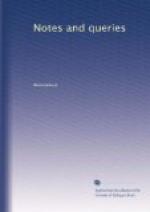SAMUEL HICKSON.
Oct. 10. 1850.
If one, who is but a charmed listener to Shakspeare, may presume to offer an opinion to practised interpreters, I should suggest to MR. SINGER and MR. COLLIER, another and a totally different reading of the passage in discussion by them from the exquisite opening scene of the 3d Act of the Tempest.
There can be little doubt that “most busy” applies more poetically to thoughts than to labours; and, in so much, MR. SINGER’S reading is to be commended. But it is equally true that, by adhering to the early text, MR. COLLIER’S school of editing has restored force and beauty to many passages which had previously been outraged by fancied improvements, so that his unflinching support of the original word in this instance is also to be respected. But may not both be combined? I think they may, by understanding the passage in question as though a transposition had taken place between the words “least” and “when”.
“Most busy when least I do it,”
or,—
“Most busy when least employed.”
forming just the sort of verbal antithesis of which the poet was so fond.
An actual transposition of the words may have taken place through the fault of the early printers; but even if the present order be preserved, still the transposed sense is, I think, much less difficult than the forced and rather contradictory meaning contended for by MR. COLLIER. Has not the pause in Ferdinand’s labour been hitherto too much overlooked? What is it that has induced him to forget his task? Is it not those delicious thoughts, most busy in the pauses of labour, making those pauses still more refreshing and renovating?
Ferdinand says—
“I forget,”—
and then he adds, by way of excuse,—
“But the sweet thoughts do
even refresh my labours,
Most busy when least I do it.”
More busy in thought when idle, than in labour when employed. The cessation from labour was favourable to the thoughts that made it endurable.
Malone quarrelled with the word “but”, for which he would have substituted “and” or “for”. But in the apologetic sense which I would confer upon the last two lines of Ferdinand’s speech, the word “but”, at their commencement, becomes not only appropriate but necessary.
A.E.B.
Leeds, October 8. 1850.
* * * * *
“LONDON BRIDGE IS BROKEN DOWN.”
(Vol. ii., p. 258.)
Your correspondent T.S.D. does not remember to have seen that interesting old nursery ditty “London Bridge is broken down” printed, or even referred to in print. For the edification then of all interested in the subject, I send you the following.




